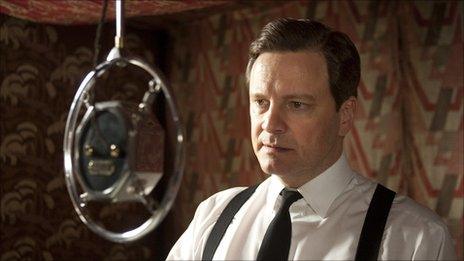Colin Firth on being Prince Albert in The King's Speech
- Published

At the beginning of The King's Speech there is a scene in which the humble microphone is transformed into an object of terror.
It is 1925 and Prince Albert (known as Bertie, and the future King George VI) has to make a speech at Wembley Stadium that will be broadcast live across the Empire.
Radio is taking off as a mass medium and this is the future king's first broadcast. But, afflicted by a stammer since childhood, his speech is a disaster.
Colin Firth, who plays George VI, listened to archive recordings to research his stammer for the film.
"I'd never read a royal biography until I did this film," admits the actor, who won the coveted best actor Oscar for the role.
"It wasn't an easy one to research because the Royal Family don't let you get that close, so one is dependent on written material.
"The footage of George VI was useful - not so much as material to imitate, but because I saw something in the quality of the man. There's a humanity and an unassuming decency about him which I tried to focus on."
Footage of The King's Speech courtesy of Momentum Pictures
Firth also took advice from the screenwriter, David Seidler, who suffered from a profound stammer as a child.
"He was incredibly eloquent about how that feels. He referred to a drowning sensation - when you hit that terrible silence that you can't climb out of. That's something I carried with me."
F word
The King's Speech is based on the true story of Queen Elizabeth II's father and his friendship with his unorthodox speech therapist Lionel Logue, played by Geoffrey Rush.
As the second son of George V, Bertie was not expected to ascend to the throne, but when his brother Edward abdicated to marry American Wallis Simpson, Bertie was crowned King George VI.
It is his wife, Queen Elizabeth - the future Queen Mother (played by Helena Bonham Carter) - who approaches therapist Logue to help the king find his public speaking voice as World War II looms.
Nine weeks before filming began, the production team discovered that Lionel Logue had a grandson living in London, who still had Logue's papers, including a diary detailing his working relationship with the king.
The script was immediately rewritten, and filming took place in various locations in England including Regent's Park, Ely Cathedral, Harley Street and Battersea Power Station.
One key scene sees King George VI being encouraged by Logue to swear to overcome his stammer.
The repeated use of the F word led to the British Board of Film Classification to give the film a 15 rating which was lowered to 12A after an appeal by film's UK distributors.
Did the actors play with stronger versions of that scene in other takes?
"Yes, we did," says Firth. "It was scripted but we adjusted the volume button on it every so often, so to speak, and there was a version which had the producer come running in saying 'Don't do that you'll get an 18 certificate!'"
He adds: "The swearing wasn't just there for comic effect, it wasn't just there to express rage. It was there because we see a very, very repressed man using forbidden words to have a moment of release."
In an interview situation, Firth comes across as eloquent and thoughtful. Does he ever get tongue-tied?
"Absolutely. I will sometimes get myself into complete knots. I will dry up - on stage, at a press conference, wherever.
"I think that losing one's fluency isn't to do with one's vocabulary or one's capacity to string a sentence together. A lot of very fine writers are terrible public speakers.
"One of the things that was most painful to observe about George VI is that if you read what he wrote, this is a man with a subtle, elegant mind. He had wit, a strong sense of irony and was judged as dull-witted because he couldn't express all that.
'Invisible personality'
"There was a whole personality that was invisible to the people around him. I've read a bit more about the issues attached to stammering since and that is common - we're talking about people who have a great deal to say and can't. I think that was the thing I found most compelling in dealing with this character."
Firth was Oscar-nominated last year for his role in Tom Ford's A Single Man, but lost out to Jeff Bridges (Crazy Heart).
Firth did, however, get the Bafta - and famously thanked the fridge repairman who apparently distracted him from sending an e-mail turning down the part.
And now he has done the double, with the best actor Bafta and best actor Oscar for The King's Speech.
But how important are awards to Firth?
"I like them when I've got them," he replies without hesitation. "I'd much rather be polishing the ones I've got than dreaming of ones that haven't even been suggested.
"They are basically a code for 'we like the film'. They are a great advantage to a film's visibility - particularly a very small film, and this is a very small film.
"I think it can be mistaken in some ways for having something to do with the establishment simply because it's about kings, queens and prime ministers as much as it's about a struggling, obscure speech therapist.
"If you made a film for a very small amount of money and it doesn't have a massive financial promotional machine behind it, then awards and festival buzz and critical love is the fuel on which it goes forward. So we welcome anything we can get."
The King's Speech is in cinemas on 7 January 2011
- Published17 December 2010
- Published16 December 2010
- Published22 October 2010
- Published6 December 2010
- Published17 January 2011
- Published29 December 2010